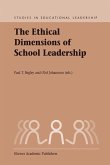The goal of this work was to determine if significant differences exist among public school principals in the state of Indiana based on level and locale of school, gender, ethnicity, source of ethical development, and years of service related to ethical areas of knowledge, disposition, and performance. The population for this study consisted of 1900 public school principals in the state of Indiana. Significant differences were found in level and locale of school, yeas of service, ethnicity and sources of ethical development as they relate to the areas of Knowledge, Dispositions, and Performances of selected ethical preparedness statements derived from ISLLC Standard 5. Further research is recommended to better understand the reasoning behind why more K-5 public school principals respond more often on educational surveys than other principals, why grades 7-12 administrators have a more conservative and ethical outlook, how ethical development plays such a crucial role in professional training, and why gender consistently brings about no significant difference.
Bitte wählen Sie Ihr Anliegen aus.
Rechnungen
Retourenschein anfordern
Bestellstatus
Storno








